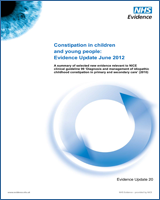From: Constipation in children and young people

Constipation in children and young people: Evidence Update June 2012: A summary of selected new evidence relevant to NICE clinical guideline 99 ‘Diagnosis and management of idiopathic childhood constipation in primary and secondary care’ (2010) [Internet].
Evidence Update, No. 20.
London: National Institute for Health and Clinical Excellence (NICE); 2012.
Copyright © National Institute for Health and Clinical Excellence, 2012.
All rights reserved. This material may be freely reproduced for educational and not-for-profit purposes. No reproduction by or for commercial organisations, or for commercial purposes, is allowed without the express written permission of NICE.
NCBI Bookshelf. A service of the National Library of Medicine, National Institutes of Health.